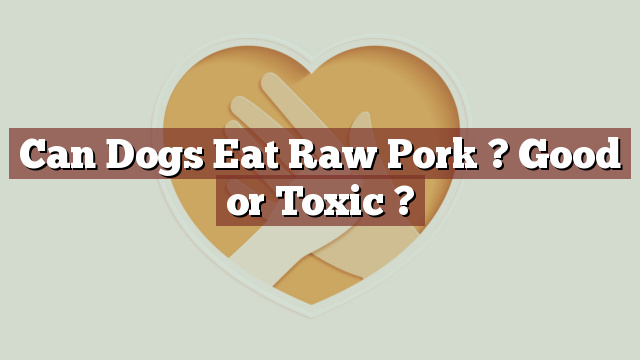Can Dogs Eat Raw Pork? Good or Toxic?
As dog owners, it is essential to be knowledgeable about what foods are safe and beneficial for our beloved pets. One food that raises questions for many pet owners is raw pork. In this article, we will explore the nutritional value of raw pork for dogs, discuss whether it is safe or toxic for them, examine the potential risks and benefits, and provide guidance on what to do if your dog consumes raw pork.
Nutritional Value of Raw Pork for Dogs: Is it Good or Toxic?
Raw pork contains a variety of nutrients that can be beneficial for dogs. It is a rich source of protein, which is vital for muscle growth and repair. Additionally, pork provides essential amino acids, vitamins (such as B vitamins and vitamin D), and minerals (including zinc, iron, and selenium) that contribute to overall canine health. However, it is important to note that these nutrients can also be obtained from other sources that may be safer for dogs.
Can Dogs Eat Raw Pork Safely or is it Toxic for Them?
No, dogs should not eat raw pork. While pork itself is not inherently toxic to dogs, there are several reasons why it is not recommended to feed them raw pork. One of the primary concerns is the potential presence of parasites, such as Trichinella spiralis, which can cause severe health issues in dogs. These parasites are often found in pork and can be detrimental to a dog’s digestive system. Moreover, raw pork poses a higher risk of bacterial contamination, including the presence of Salmonella or E. coli, which can lead to food poisoning in dogs.
It is crucial to prioritize the safety and well-being of our canine companions, so it is best to avoid feeding them raw pork altogether.
Potential Risks and Benefits of Dogs Consuming Raw Pork
Feeding dogs raw pork can pose significant risks to their health. As mentioned earlier, parasites and bacterial contamination are major concerns. Consumption of these harmful agents can lead to gastrointestinal upset, vomiting, diarrhea, and even more severe health problems. Furthermore, raw pork can be high in fat, which may contribute to obesity and pancreatitis in dogs.
On the other hand, there are alternative protein sources, such as cooked lean meats and commercially prepared dog foods, that provide the necessary nutrients for dogs without the associated risks. These alternative options are specifically formulated to meet the nutritional needs of dogs and undergo rigorous safety standards.
What to Do if Your Dog Eats Raw Pork: Steps to Take
If you suspect that your dog has consumed raw pork, it is important to take prompt action. First, observe your dog for any signs of discomfort, such as vomiting, diarrhea, or lethargy. If you notice any concerning symptoms, contact your veterinarian immediately. They will be able to assess the situation and provide appropriate guidance based on your dog’s specific circumstances. It is crucial not to induce vomiting without professional advice, as it can worsen certain conditions.
Conclusion: Balancing Risks and Benefits of Raw Pork for Dogs
In conclusion, it is best to avoid feeding raw pork to dogs due to the potential risks associated with parasites and bacterial contamination. While pork itself can provide beneficial nutrients, there are safer alternatives available that fulfill a dog’s nutritional requirements. Cooked lean meats and commercially prepared dog foods are preferable options that maintain the balance between nutrition and safety. As responsible pet owners, it is our duty to prioritize our dogs’ health and well-being by making informed choices about their diet.
Thank you for investing your time in exploring [page_title] on Can-Eat.org. Our goal is to provide readers like you with thorough and reliable information about various dietary topics. Each article, including [page_title], stems from diligent research and a passion for understanding the nuances of our food choices. We believe that knowledge is a vital step towards making informed and healthy decisions. However, while "[page_title]" sheds light on its specific topic, it's crucial to remember that everyone's body reacts differently to foods and dietary changes. What might be beneficial for one person could have different effects on another. Before you consider integrating suggestions or insights from "[page_title]" into your diet, it's always wise to consult with a nutritionist or healthcare professional. Their specialized knowledge ensures that you're making choices best suited to your individual health needs. As you navigate [page_title], be mindful of potential allergies, intolerances, or unique dietary requirements you may have. No singular article can capture the vast diversity of human health, and individualized guidance is invaluable. The content provided in [page_title] serves as a general guide. It is not, by any means, a substitute for personalized medical or nutritional advice. Your health should always be the top priority, and professional guidance is the best path forward. In your journey towards a balanced and nutritious lifestyle, we hope that [page_title] serves as a helpful stepping stone. Remember, informed decisions lead to healthier outcomes. Thank you for trusting Can-Eat.org. Continue exploring, learning, and prioritizing your health. Cheers to a well-informed and healthier future!

